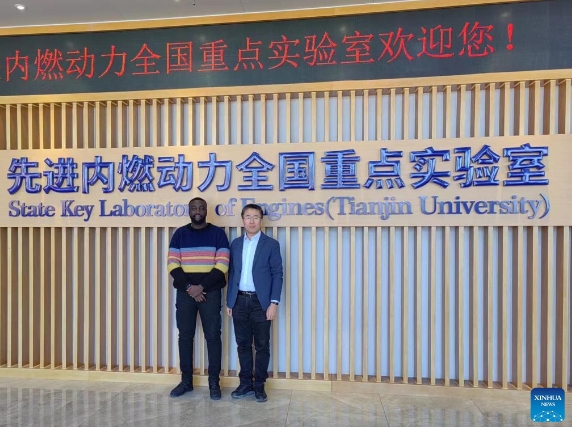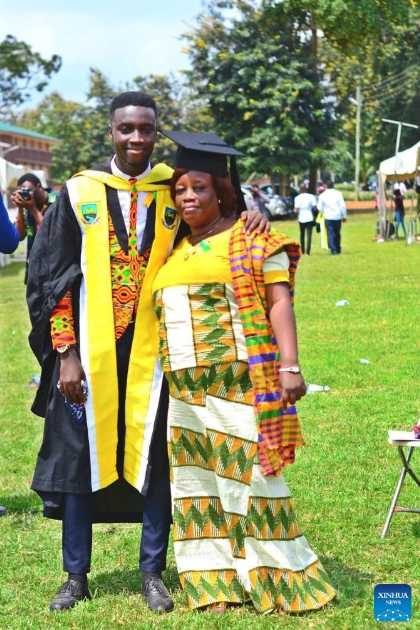From Ghana to China, a young researcher's quest for greener world

Jeffrey Dankwa Ampah (L), a doctoral candidate from the Republic of Ghana, poses for a photo with Liu Haifeng, a Chinese professor from Tianjin University, in north China's Tianjin Municipality, Jan. 3, 2024. (Xinhua)
It has long been Jeffrey Dankwa Ampah's dream to build a green and sustainable world.
"My primary objective is to formulate viable pathways for the world to transition away from polluting fossil fuels and eventually help to realize our climate goals," said Ampah, a doctoral candidate from the Republic of Ghana, studying at Tianjin University in north China's Tianjin Municipality.
Ampah's PhD centers on global climate challenges, specifically how to minimize the use of carbon to achieve global decarbonization goals, and reduce the negative impact of carbon removal on global energy, land, water and food systems.
When he was in primary school, Ampah was irritated by frequent power outages. "Back then in my country, electricity was expensive and unstable. At one of those blackout moments, as a young inquisitive kid, I looked up at the blazing sun and wondered when my country would start generating electricity from the sun as the western world did since it is free, clean, and inexhaustible."
This burgeoning thought led him to study renewable energy engineering at the University of Energy and Natural Resources (UENR) in Ghana for his bachelor's degree.
"UENR is a publicly funded national institution seeking excellence in energy and natural resource sciences. That's where my quest for cleaner energy to benefit the world began," Ampah recalled.
In 2019, two years after he finished his undergraduate studies and two years into a teaching assistant role at UENR, he decided to further his studies abroad and chose China.
"The remarkable advancements China made in the development of renewable energy sources and its commitment to combating climate change are the main reasons why I chose to study in China," Ampah said. He learned from a report by the International Energy Agency that China is at the forefront of the renewable energy globally.
"In 2015, China set the goal of peaking carbon dioxide emissions around 2030 and has taken many effective measures," he said. These achievements and commitments deeply attract Ampah as a renewable energy researcher.
What made the choice to study in China even more appealing was the availability of a full scholarship if he applied to a Chinese university thanks to the Belt and Road Initiative.
"A number of Ghanaian students have been awarded scholarships since our country joined the initiative in 2018. I think it really helps cultivate the talents needed for Ghana's development," he said.
Ampah embarked on the journey to study in China in 2019. He owes much of his academic success to the excellent environment Tianjin university provides. "The research environment here is very superior. Our university boasts excellent facilities, a superb faculty and inspiring learning vibes."
He said in particular that the personal traits he observed in most of his lab peers have significantly influenced his work ethic and approaches. "Most of my Chinese friends are self-disciplined, persistent, and steadfast with their research. Together they make good researchers."
During the five years in China, Ampah has spent most of his vacations studying on campus. For him, the experience of studying in China is a life-changing event, and there is not a single day to waste.
Throughout his academic journey at Tianjin University, from the master's program to his current doctoral pursuit, Ampah has published nearly 50 high-level academic papers in the field of renewable energy and climate change. His research on clean and low-carbon alternative fuels for shipping have received widespread attention from the international community, including officials from the International Maritime Organization.
Ampah has been closely following the cooperation between China and Ghana in renewable energy and climate change adaptation under the Belt and Road Initiative framework. He believes, against the backdrop of global climate change crisis, the development of green energy is also one of the demands of African countries.
He strongly recommends that Ghana focuses on the transition from fossil fuels to renewable energy, fully utilizing its abundant solar, wind, and biomass energy for energy transformation. "In this regard, China has set an example for us," he added.
Ampah said he will continue to conduct research in the fields of renewable energy and climate change, learn from China's experience in high-quality development of new energy, serve global environmental governance and economic development, and contribute to the friendly development between China and Africa.

Jeffrey Dankwa Ampah (L) poses for a photo with his mother at his bachelor graduation ceremony in Ghana on Aug. 12, 2017. (Xinhua)
Editor:伏娅敏
